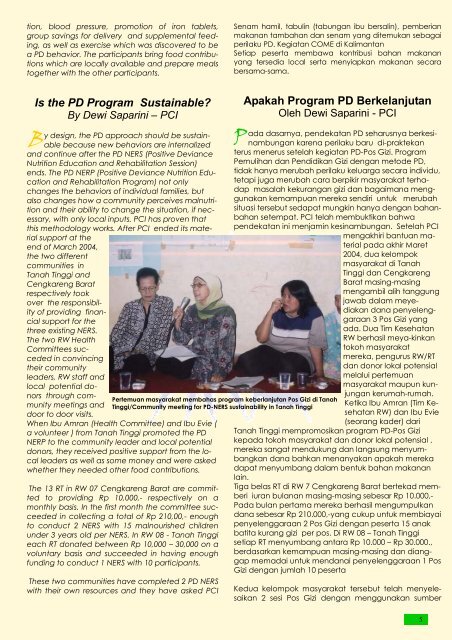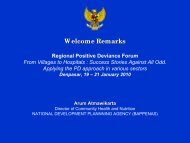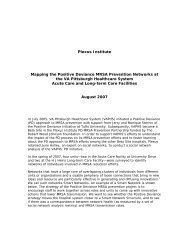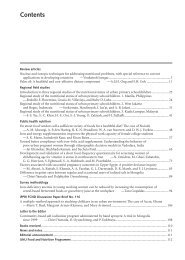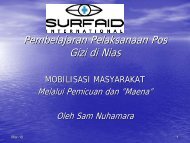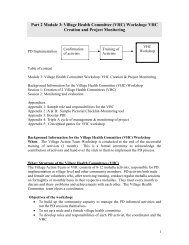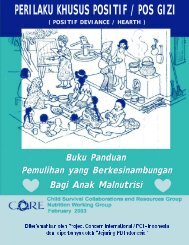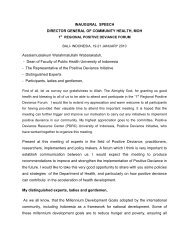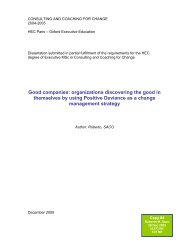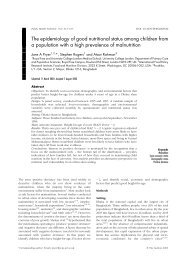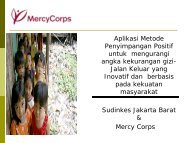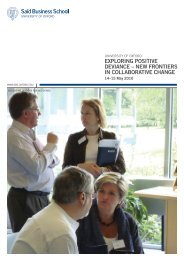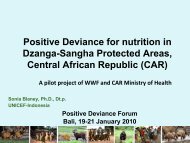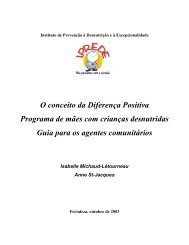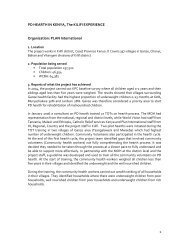“Positive Deviance” Bulletin
“Positive Deviance” Bulletin
“Positive Deviance” Bulletin
Create successful ePaper yourself
Turn your PDF publications into a flip-book with our unique Google optimized e-Paper software.
tion, blood pressure, promotion of iron tablets,<br />
group savings for delivery and supplemental feeding,<br />
as well as exercise which was discovered to be<br />
a PD behavior. The participants bring food contributions<br />
which are locally available and prepare meals<br />
together with the other participants.<br />
Senam hamil, tabulin (tabungan ibu bersalin), pemberian<br />
makanan tambahan dan senam yang ditemukan sebagai<br />
perilaku PD. Kegiatan COME di Kalimantan<br />
Setiap peserta membawa kontribusi bahan makanan<br />
yang tersedia local serta menyiapkan makanan secara<br />
bersama-sama.<br />
Is the PD Program Sustainable?<br />
By Dewi Saparini – PCI<br />
y design, the PD approach should be sustainable<br />
because new behaviors are internalized<br />
B<br />
and continue after the PD NERS (Positive Deviance<br />
Nutrition Education and Rehabilitation Session)<br />
ends. The PD NERP (Positive Deviance Nutrition Education<br />
and Rehabilitation Program) not only<br />
changes the behaviors of individual families, but<br />
also changes how a community perceives malnutrition<br />
and their ability to change the situation, if necessary,<br />
with only local inputs. PCI has proven that<br />
this methodology works. After PCI ended its material<br />
support at the<br />
end of March 2004,<br />
the two different<br />
communities in<br />
Tanah Tinggi and<br />
Cengkareng Barat<br />
respectively took<br />
over the responsibility<br />
of providing financial<br />
support for the<br />
three existing NERS.<br />
The two RW Health<br />
Committees succeded<br />
in convincing<br />
their community<br />
leaders, RW staff and<br />
local potential donors<br />
through community<br />
meetings and<br />
door to door visits.<br />
When Ibu Amran (Health Committee) and Ibu Evie (<br />
a volunteer ) from Tanah Tinggi promoted the PD<br />
NERP to the community leader and local potential<br />
donors, they received positive support from the local<br />
leaders as well as some money and were asked<br />
whether they needed other food contributions.<br />
Pertemuan masyarakat membahas program keberlanjutan Pos Gizi di Tanah<br />
Tinggi/Community meeting for PD-NERS sustainability in Tanah Tinggi<br />
The 13 RT in RW 07 Cengkareng Barat are committed<br />
to providing Rp 10,000,- respectively on a<br />
monthly basis. In the first month the committee succeeded<br />
in collecting a total of Rp 210,00,- enough<br />
to conduct 2 NERS with 15 malnourished children<br />
under 3 years old per NERS. In RW 08 - Tanah Tinggi<br />
each RT donated between Rp 10,000 – 30,000 on a<br />
voluntary basis and succeeded in having enough<br />
funding to conduct 1 NERS with 10 participants.<br />
These two communities have completed 2 PD NERS<br />
with their own resources and they have asked PCI<br />
Apakah Program PD Berkelanjutan<br />
Oleh Dewi Saparini - PCI<br />
ada dasarnya, pendekatan PD seharusnya berkesinambungan<br />
karena perilaku baru di-praktekan<br />
P<br />
terus menerus setelah kegiatan PD-Pos Gizi. Program<br />
Pemulihan dan Pendidikan Gizi dengan metode PD,<br />
tidak hanya merubah perilaku keluarga secara individu,<br />
tetapi juga merubah cara berpikir masyarakat terhadap<br />
masalah kekurangan gizi dan bagaimana menggunakan<br />
kemampuan mereka sendiri untuk merubah<br />
situasi tersebut sedapat mungkin hanya dengan bahanbahan<br />
setempat. PCI telah membuktikan bahwa<br />
pendekatan ini menjamin kesinambungan. Setelah PCI<br />
mengakhiri bantuan material<br />
pada akhir Maret<br />
2004, dua kelompok<br />
masyarakat di Tanah<br />
Tinggi dan Cengkareng<br />
Barat masing-masing<br />
mengambil alih tanggung<br />
jawab dalam meyediakan<br />
dana penyelenggaraan<br />
3 Pos Gizi yang<br />
ada. Dua Tim Kesehatan<br />
RW berhasil meya-kinkan<br />
tokoh masyarakat<br />
mereka, pengurus RW/RT<br />
dan donor lokal potensial<br />
melalui pertemuan<br />
masyarakat maupun kunjungan<br />
kerumah-rumah.<br />
Ketika Ibu Amran (Tim Kesehatan<br />
RW) dan Ibu Evie<br />
(seorang kader) dari<br />
Tanah Tinggi mempromosikan program PD-Pos Gizi<br />
kepada tokoh masyarakat dan donor lokal potensial ,<br />
mereka sangat mendukung dan langsung menyumbangkan<br />
dana bahkan menanyakan apakah mereka<br />
dapat menyumbang dalam bentuk bahan makanan<br />
lain.<br />
Tiga belas RT di RW 7 Cengkareng Barat bertekad memberi<br />
iuran bulanan masing-masing sebesar Rp 10.000,-<br />
Pada bulan pertama mereka berhasil mengumpulkan<br />
dana sebesar Rp 210.000,-yang cukup untuk membiayai<br />
penyelenggaraan 2 Pos Gizi dengan peserta 15 anak<br />
batita kurang gizi per pos. Di RW 08 – Tanah Tinggi<br />
setiap RT menyumbang antara Rp 10.000 – Rp 30.000.,<br />
berdasarkan kemampuan masing-masing dan dianggap<br />
memadai untuk mendanai penyelenggaraan 1 Pos<br />
Gizi dengan jumlah 10 peserta<br />
Kedua kelompok masyarakat tersebut telah menyelesaikan<br />
2 sesi Pos Gizi dengan menggunakan sumber<br />
5


